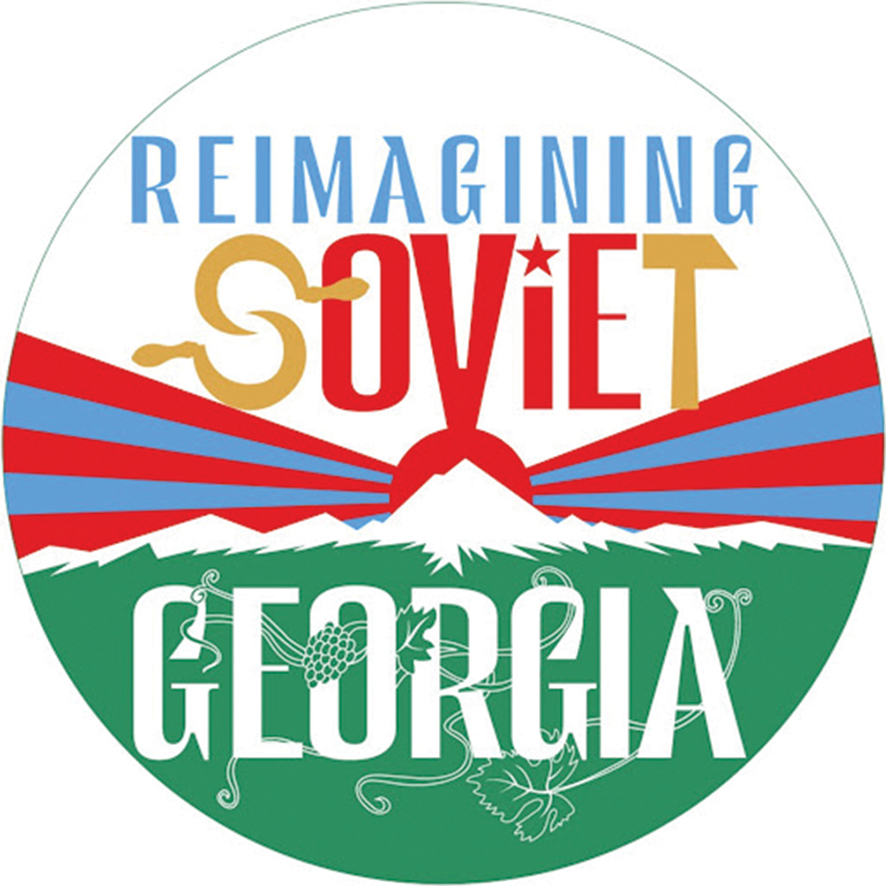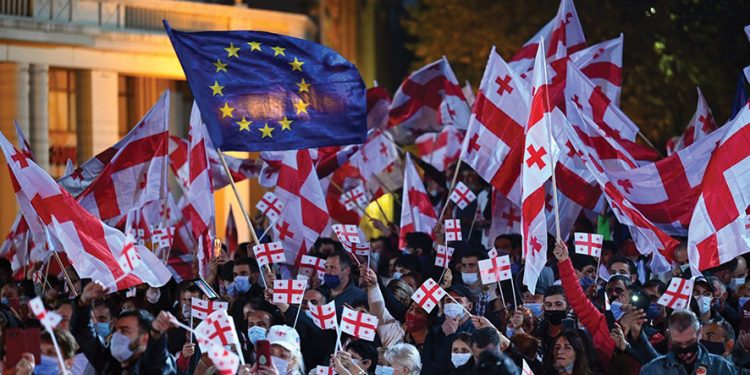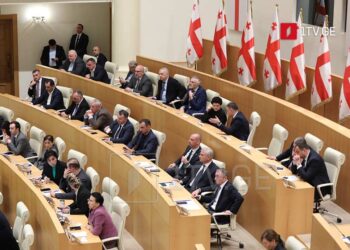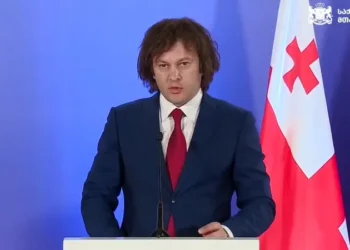One thousand years ago, a group of men broke into the residence of the great French lover and intellectual, Peter Abelard. Upon discovering his hiding place, they held him down and performed what must have been a most clumsy and imprecise medical procedure. Abelard was castrated.
These assailants had been dispatched by a man named Fulbert, the enraged uncle of Heloise d’Afgenteuil, the beautiful and now pregnant love of Peter’s life.
In his prime, Abelard was the medieval equivalent of a celebrity professor, excelling in philosophy, theology, music, teaching, logic, composition, poetry, and passionate romancing. His lectures drew thousands, and his talent in rhetoric and debate left a trail of jealous contemporaries in his wake.
Often labeled a heretic, Abelard anticipated the Enlightenment throughout his career. “By doubting we come to inquiry,” he wrote. “And by inquiry we perceive truth.”
This is the ethos with which I listen to, and appreciate, the podcast Reimagining Soviet Georgia. Hosted by Bryan Gigantino and Sopo Japaridze, the series offers a departure from the worn and familiar rhetoric of neoliberalism. Bryan and Sopo are communists and contrarians. To listen to them is to challenge and sharpen one’s own viewpoints and, often, to risk offense.
Indeed, at times, the zeal with which they publicly embrace controversy can be jarring. For example, in a thread on X, Sopo argues that Russia is not an occupier and facilitator of ethnic cleansing in Abkhazia, but the rescuer of Abkhazia from the “virulent hate sown by [Georgian] ethnic nationalists.” A pre-podcast era example shows Bryan performing a jam poetry piece dedicated to Mother Theresa. With the visibly uncomfortable moderator in the background, he says: “They call you a beautiful flower, with petals of peace, love and harmony.” Then, making the sign of the cross, he shouts “Bull fucking shit! You are a witch not worthy of hanging in my garage!” He mimes the looping of a noose around his neck, to scattered hoots and hollers from the crowd.
While much of their subversive series is devoted to sympathetic reexaminations of the Soviet era, recent episodes have turned to Georgia’s current political crisis. This crisis has seen months of protest marches and rallies outside the parliament, sparked by a new law that grants extensive surveillance and punitive powers over civil society and non-governmental organizations, enabling access to communications, personal information, and internal documents. Initially proposed in 2023 by the far-right People’s Power Party, the law faced severe public backlash and was withdrawn, only to be rebranded and reintroduced by the Georgian Dream Party in 2024.
For Georgians, the longing to be part of Europe is the wish for borders respected. For sovereignty granted. For nationhood to be not only recognized, but protected
This law is felt to be a slap in the face and omen of worsening crackdowns by an increasingly authoritarian ruling party in the hands of Georgian dream founder and oligarch Bidzina Ivanishvili. Despite mass protests, the law has now passed the three required readings and votes but has been vetoed by the president. The legislation will now undergo one more hearing and vote to overturn the veto, which it is expected to clear. On both national and international stages, outrage is at an all-time high, and tensions are still rising.
At such a moment, clarity and truth telling are paramount.
Unfortunately, the framing of the crisis by the hosts Reimagining Soviet Georgia mirrors the main narratives of the ruling party’s propaganda. They attribute the backlash not to the frustrated wishes and feelings of people, but to manipulation by Western powers in a global geopolitical struggle. This commentary has percolated outside of Georgia where the bulk of their listenership resides, many of them in the same Slavic Studies departments where Georgia is so often lazily lumped.
Bryan begins the most recent episode with an attempt to summarize the crisis’s antecedents. “While this outline cannot address every single factor,” he says, “it is an attempt by me to summarize where we are.”
Yet crucial omissions abound. He fails to mention state forces’ violent crackdown on protesters, or the spate of beatings outside of homes, or the widespread intimidation campaign by phone, targeting dissenters and their families. Nor does he acknowledge the spontaneous and uncoordinated nature of the protests, or their general lack of affiliation with opposition parties.
Instead, Bryan asserts that the general strategy of the Georgian Dream strategy is simply “to negotiate the terms of its desired EU membership” and prevent disruption of “capital and resource flows”, all in an apparent good faith effort “to avoid geopolitical conflict and protect Georgia’s shifting role in an emergent multipolar world.”
Nowhere is mentioned the erosion of democratic institutions, the suppression of media, the attacks on opposition figures, or the ruling party’s autocratic tendencies. Also sidestepped is President Salome Zurabishvili’s own condemnation of the law, and repeated apologies in now familiar statements, such as: “I don’t know how long we will continue playing this two-faced game, where we pretend that we want to keep going towards the EU, that we want candidate status. At this time not only are we not doing what we must… we are actually taking contrary steps” (excerpt from the President’s July 21, 2022, interview with the Georgian Public Broadcaster).
My father was out in the street doing this exact same thing so that I wouldn’t have to. But here we are again
What are these contrary steps? Our hosts mention none of them, but in addition to the Foreign Agent Law, the President also may be referring to openly hostile rhetoric directed at EU diplomats, or a series of laws facilitating the movement of dark money into the country.
Or perhaps she is thinking of the ruling party’s abandonment of the Charles Michel agreement, or the fast-tracking of a clan of friendly judicial appointees, or the denial that the party’s billionaire patron is an oligarch, or the obstruction of the president from visiting European capitals to discuss EU ascension, or the sanctioning of the president for taking the trips anyway, or the parliamentary acts giving the government greater control over the Central Elections Commission, or the reports by watchdogs exposing high-level financial corruption in the government, or the reports of intimidation and vote-buying that marred the previous parliamentary elections, or the jailing of critical media figures, or the tightening of the Law of Broadcasting, or the abolishing of the State Inspector’s Office, or the sudden swapping out of Prime Ministers, or the universal condemnation of the law by Georgia’s closest European partners, or the positive statements about the law made by Russian political figures, or the series of violent attacks on opposition leaders, or the judicial corporatism, or the attempt to impeach the president, or accusations that the West is fomenting revolution, or the clampdown on access to archives, or the restricting of access to public information, or the endless fearmongering about a conspiracy to open up a second front in the Ukrainian war, or the intimating that Europe is controlled by a shadowy “Global War Party,” or the extensive wiretapping campaign of citizens, journalists, politicians, and foreign diplomats by the State Security Service, or the use of the Prosecutor’s Office to target a bank owned by a prominent opposition figure, or the sabotaging and appropriation of the Anaklia Deep Sea Port Project, or the shielding of the former Prosecutor General and Georgian-Russian businessman with ties to Russia’s FSB security service from financial sanctions, or the party’s pivot to anti-Queer legislation and rhetoric, or the anti-Western People’s Power Party formed from the ranks of Georgian Dream, or the staff purges of nominally independent institutions, or the failures to investigate corrupt judges…
Nowhere in Bryan’s generous assessment of the ruling party are any of these problems even implicitly mentioned. Nor does he note that civil society is the only space still left outside of the ruling party’s control. He also fails to acknowledge that these protests are, at their core, pro-European demonstrations that follow on the heels of similar protests over several years. They are filled with young people anxious about their democratic future.
According to Bryan, the overreaction on the part of the public is derived from “the culmination of years of opposition lobbying” by a network of “protesters, their allies, and the NGO sector.” Tying this corrosive NGO legacy to the overthrow of Eduard Shevardnadze in 2003, Bryan depicts the Rose Revolution as a Western-orchestrated coup to erect an “authoritarian neoliberal state,” and not as a popular movement driven by outrage at ubiquitous crime, police corruption, state theft, poverty, and blatant election manipulation. Going further, he places the blame for the 2008 Russo-Georgian War not on a foreign military force invading a sovereign country, but on President Mikhail Saakashvili who “intentionally instigated” the conflict.
His outline conspicuously fails to address the main question that weighs heavily on so many minds. Why on earth, in an election year, would a ruling party of declining popularity, desperate to maintain control, suddenly reintroduce a law guaranteed to spark mass public backlash and broad condemnation from the very European Union the party claims to wish to join?
The swift reintroduction and hasty passage of this law in parliament, coupled with a surge of anti-Western hostility, has sent shockwaves through the international community, leaving a general impression that powerful developments are taking place behind the scenes.
The party line is that this law is merely a tool to improve NGO transparency and bring Georgia closer to Europe. This thin pretense evaporated completely at the third and final reading of the law in Parliament where—in what appears to be an extra-legal last-minute revision—the reach of the law was extended to facilitate the surveillance of anyone suspected of association with an “organization of foreign influence.”
Worse still, and strangely for a historian, Bryan fails to touch on the historical reasons that a European future has long been desired by the majority of the Georgian people.
Georgia’s democratic aspirations and troubled history as a beleaguered imperial possession help explain not only the feelings pouring out in the streets today, but also the mass mobilizations in 2013, 2003, 1991, 1989, 1978, 1956, 1923, 1918, and 1907. This history includes the pre-revolutionary break of the Social Democrats from the Bolsheviks and the resistance to Russification championed by national heroes like Akaki Tsereteli, Iakob Gogebashvili, and Ilia Chavchavadze.
As evinced by its title, one of the tenets of Reimagining Soviet Georgia is that Georgians should better appreciate their Soviet history under the Kremlin. Yet, even among Georgians steeped in Soviet nostalgia, many will tell you that no amount of Kremlin generosity is worth the price of being rusetis mona – a slave of Russia.

One hundred years ago, the Patriarch of the Georgian Orthodox Church, Saint Ambrosius, dispatched a passionate letter of appeal to Europe, pleading for intervention after the Soviet invasion. He listed Georgia’s grievances as follows: The invasion of Georgia by the Red Army; 117 years of tsarist despotism; the yoke of slavery now reimposed; the confiscation of Georgian property “soaked in blood and sanctified with the bones of its ancestors;” the attack on the country’s mother tongue and national culture; the banishment of faith “under a banner of false freedom;” and the ruthless persecution of the clergy.
Summoned to a Soviet show trial, Saint Ambrosius delivered a passionate speech to his captors, ending with the unforgettable line: “My soul belongs to God; my heart to my homeland; and you have been given my body, you bastards!”
In recent history, Georgia’s peaceful transfers of power in November 2003 and October 2012 were facilitated by Western support. Successive Georgian governments and the people have consistently embraced Western aid and military support. Yet the path to Georgia’s EU membership has also been marked by a frustrating, and often patronizing, “carrot-and-stick” approach. For many, the granting EU candidacy status in 2023 signaled a Europe finally ready to assign Georgia’s situation the weight it has long deserved.
For the Georgians marching today in the streets of Tbilisi, the longing to be part of Europe demands, first and foremost, a simple and honest acknowledgement by commentators. Georgians do not need lectures on the precariousness of their geopolitical position. They know firsthand the difficult lessons of history many of us learn only in classrooms. They know that to defy powerful empires entails great risk. They know that the West is not always a reliable partner. They know small countries are vulnerable. They know what it’s like to have their lands stolen, their people subjugated, their capital occupied, their culture folklorized, their futures obstructed, their family members exiled, and their writers and politicians purged. They know that survival often depends on undesired collaborations coerced under the threat of annihilation.
However, many far-left factions view any Western involvement as evidence of malfeasance and meddling, and our podcast hosts make no secret of their hatred for western-funded NGOs in Georgia. Such groups, scoffing at the very notion of Western values and partnerships, seem tacitly to approve of the Bolshevik-style coups of the past, with anti-Western locals as figureheads.
But the literature of the Caucasus is also animated by legacies that subvert imperious power and champion heroes who opt out of imposed systems of control. This is an ethos that appeals to a natural justice transcending the authority brought by uninvited masters and their local administrators. This is the same spirit that animates the demonstrations today.
For Georgians, Europe represents the hope of enduring stability and rule of law, representative democracy, independent judiciaries, and a system that does not need to be reset every 10 years with mass protests, as government after government slip into authoritarian tendencies. This is what the demonstrators wish for when they look to the West.
“I am so sick of this,” an older protester told me outside the Parliament a few weeks ago. “My father was out in the street doing this exact same thing so that I wouldn’t have to. But here we are again.” One of my students explained her participation this way: “They want to control everything. That’s why they want this law. But we will not give up, because we are fighting for our country.”
Thomas De Waal, one of the region’s most respected commentators, calls this bill “deliberately imprecise and menacing in intent,” and in a May 21 article assesses the Georgian Dream strategy this way:
“What the ruling party evidently wants is ‘Fortress Georgia’, with them firmly in charge. In geopolitical terms that means elements of the following: an economic alliance with Russia; a partnership with Russian, Chinese and Turkish business; the non-aligned status and repressive capacity of Azerbaijan or one of the Central Asian states; the tax-exempt status of the British Virgin Islands; and support from illiberal governments in Europe, chiefly Hungary. It wants to pursue this while espousing a patriotic ‘Georgian traditional values’ ideology promoted by the Georgian Orthodox Church – and without formally abandoning a commitment in the constitution to European integration.”
The anxieties provoked by the Foreign Agent Law and crackdowns stem from the perception that these actions appear inconsistent with a party striving for a democratic majority though transparent and equitable electoral process.
Yet on the global stage, despite diametrically opposed polemics, the far left and far right have paradoxically converged in their final conclusions, while remaining simultaneously out of touch with the sentiments of the everyday people clamoring for their voices to be acknowledged. From each of these ideological frameworks emerge the epitome of a paternalistic condescension, wherein Georgians do not have their own thoughts and emotions, but only those implanted by a cynical West. This tracks a recurring historical irony in the history of far-left politics, in which the very voices we claim to wish to emancipate are discarded, while the atrocities committed by leftist authoritarian regimes are overlooked.
Indeed, in one of the more memorable early episodes of Reimagining Soviet Georgia, Professor Ronald Suny—an academic known for his Soviet sympathies—finds himself pushing back against Soviet apologetics. After an uncritical portrayal by the hosts of none other than Joseph Stalin, he responds, “… there were horrors in the Soviet Union, and Georgia suffered from them . . . Stalin was in some ways the grave digger of the original impulses, which are democratic-socialist, of the Revolution of 1917.”
For foreigners like Bryan and myself, it is easy to take the stability of the West for granted, to eschew national identities and to flirt again with Marxist ideology. But Georgia does not have the luxury of landmasses and oceans separating it from its historic enemies. For Georgians, the longing to be part of Europe is also the wish for borders, respected. For nationhood to be not only recognized, but protected. And for unwavering social and economic integration to be forthcoming.
All criticism aside, Reimagining Soviet Georgia is not a bad podcast. I will be the first to say we need more podcasts about Georgia with thoughtful guests and well-prepared questions, discussions about history, and a voicing of perspectives we do not get elsewhere. But what we must object to is the bad faith framing of a national crisis that uncritically reproduces political propaganda and ignores the voices and experiences of ordinary people.
To return, finally, to Peter Abelard: in his more intact days, his fame had swelled along with his audacity. He ingratiated himself with the house of Fulbert and into a tutorship of his cloistered niece, whereupon he poured out confessions of soul and deepest desire. The letters exchanged by the two lovers have become foundational texts of European romantic literature, placing Peter and Heloise in the tragic ranks of Tristan and Isolde and Romeo and Juliet.
In any good story, we expect a definitive resolution to the main conflict of the narrative. Yet, unlike Tristan and Isolde and Romeo and Juliet, Abelard and Heloise’s ending is unsatisfactory and anticlimactic. Abelard survived the amputation, but after the couple’s severance, each retire to separate hermitages, spending their remaining years in monastic patterns. Abelard was eventually able to reclaim some of his former renown, though in a much more devotional mode.
Embedded within the current crisis in Georgia is an expectation of an ultimate and decisive showdown, yet this very notion highlights a fundamental difference between narratives and real-life events. This lesson can be gleaned from both Abelard’s story and Georgia’s history of protests. Once the central crisis subsides, a conclusive resolution – whether triumphant or tragic – seldom materializes. Society is left grappling with the same challenges. We can only hope the damage done in the meantime is not irreversible.
Analysis by Ryan Sherman














